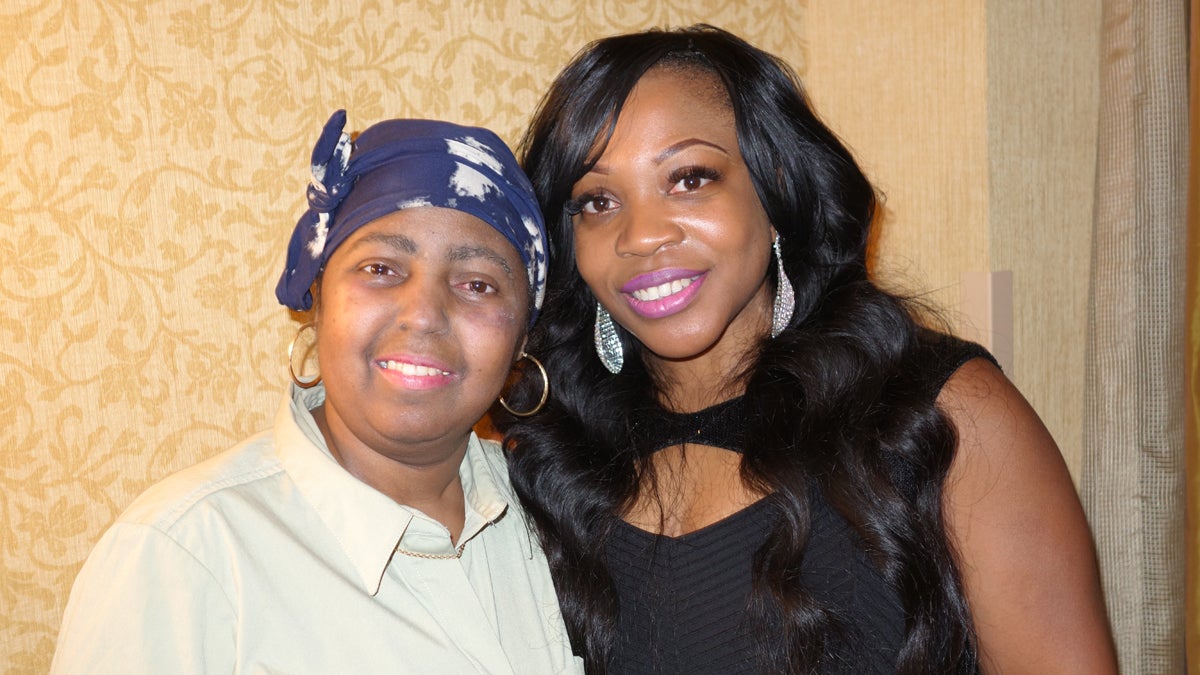Philadelphia woman meets the donor who saved her life
Listen
(Photo courtesy of Rachel McPherson)
A Philadelphia woman is likely to enjoy many more Thanksgivings following a successful bone marrow transplant.
Francesca Lynch has been cancer free for a year because a woman she got to meet only recently signed up with the National Marrow Donor Program’s Be the Match registry.
Nearly two years ago, Lynch went to her doctor complaining of what she thought was just an earache. Lynch did indeed have an ear infection, but said her physician also suspected something else.
“She requested to take blood,” Lynch said. “And I said ‘Oh no, I’m fine, I’m anemic, I’m OK. Nothing wrong with my blood, might just be asthma.’
The blood test would lead to a serious diagnosis: acute myelogenous leukemia, a rapidly advancing cancer that attacks the white blood cells. Lynch, 46, had to have two rounds of chemotherapy just to keep it at bay. But to beat the cancer entirely she would need a bone marrow transplant from someone with a similar genetic makeup.
That person turned out to be 35-year-old Loresa Wright of the Bronx, who like Lynch, is African American. Wright works at the United Way in New York and said she signed up for Be the Match in 2009 when a co-worker received a similar diagnosis.
Wright was not a bone marrow match for her colleague, who eventually found another donor and survived. Wright had also hoped to help her sister-in-law — who was not able to find a donor and died of leukemia.
Wright said for the next few years she didn’t give bone marrow much thought, until she got word that a complete stranger two hours away in Philadelphia was in need.
“I was a little nervous when I was initially contacted, but it was never a thought to not do it,” Wright said. “That’s what I signed up for.”
‘I’m so happy to be alive’
Once Lynch’s doctor confirmed the transplant’s success, Be the Match arranged for Lynch and Wright to meet a year later. But this meeting would be anything but a quiet chat in the corner booth of a restaurant.
The two women saw each other for the first time Nov. 8 on a stage in Minneapolis at the Be the Match annual meeting. Lynch thanked Wright to a standing ovation from hundreds of people.
“You’re in my heart, thank you,” Lynch told Wright as the women embraced. “I’m so happy to be alive, [to have] a second chance.”
Later that evening off stage, Wright said she was glad she finally got a chance to meet the woman she helped.
“I wish her all the best, and I definitely hope that we can remain friends,” Wright said. “I look forward to the opportunity to keeping in touch and just making sure that she’s well.”
Increasing survival rates for others
Wright said she hopes other people of color will contribute to the bone marrow registry to increase the chances of survival for others like Lynch.
Be the Match CEO Dr. Jeffrey Chell said the Minneapolis-based organization has a database of more than 12 million potential donors in the United States alone, and arranged more than 6,240 transplants in the last year.
But Chell said this particular transplant, from one African American woman to another, is something that’s essential to highlight.
“One of the important things about matching and finding the best possible donor is they’re likely to share a common ancestry with you,” Chell said.
Chell said if you need a bone marrow transplant, your chances of finding a donor today are better than they’ve ever been. But he said that probability drops significantly if you’re not of European heritage.
“If you’re Caucasian, the likelihood of finding a match is about 94 percent,” Chell said. If you’re African American, it drops down to about 68 percent.”
Airam Da Silva is on a mission to close that gap. His sister Icla died of leukemia at age 13 after traveling from Brazil to New York in the hopes of finding a bone marrow donor.
Since 1992, the Icla Da Silva Foundation has signed up thousands of potential donors, including Loresa Wright, and focuses on ethnic minorities. But Da Silva said recruiting people of color is often challenging.
“There’s a lot of misconceptions out there about bone marrow donation,” Da Silva said. “People have fears about joining the registry to donate bone marrow. And that’s our job, to create awareness and education so that they can come, ask questions and join the registry.”
With the United States becoming more and more diverse, Chell and Da Silva said it’s also important to recruit donors of mixed ethnic heritage, so everyone who needs bone marrow has an equal shot at recovery.
WHYY is your source for fact-based, in-depth journalism and information. As a nonprofit organization, we rely on financial support from readers like you. Please give today.



